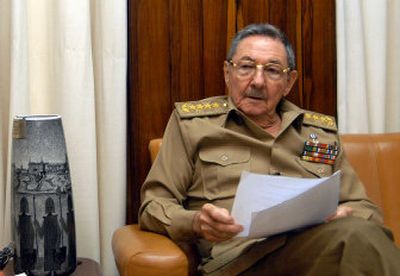Raul Castro mobilizes troops

MEXICO CITY – Raul Castro used the occasion of his first public remarks as Cuba’s interim leader to announce that he had mobilized tens of thousands of reservists and military troops in case “someone crazy” in the U.S. government decided to attack the island nation. He also called President Bush “stupid.”
The comments, published Friday in question-and-answer format in the state-run newspaper Granma, revealed little about Castro’s plans for governing Cuba while his brother, Fidel Castro, recovers from intestinal surgery. But the interview sent a clear message that Raul Castro shares his brother’s distaste for the U.S. government and his penchant for rhetorical broadsides against Bush.
A few days after Fidel Castro’s illness was revealed, Bush said the United States would support democratic change in Cuba. In the interview published Friday, Raul Castro called Bush “a common braggart.”
He also accused Bush of developing plans to forcibly remove Cubans from their homes and to dismantle the Cuban government’s “work in health, education, safety; agricultural reform, urban reform.” Millions of Cubans stand ready to meet any invasion of the island “with rifle in hand,” he said in the interview, conducted at Cuba’s military headquarters.
Still, Raul Castro said Cuba “has always been open to normalizing relations (with the United States) on an equal plane. What we can’t accept is the policy of arrogance and meddling that is frequently assumed by the administration of that country.”
Raul Castro was named temporary president of Cuba on July 31 when the government announced that Fidel Castro had undergone surgery. Rumors of Fidel Castro’s death were rampant until the Cuban government released photographs of him on Aug. 13, the communist leader’s 80th birthday. That same day, Raul Castro, who is 75, made his first appearance, though he had not commented publicly until the interview appeared Friday in Granma.
Raul Castro gave little hope of improved relations with the United States. He compared the current environment to the 1962 Cuban missile crisis, when the U.S. discovery of Soviet missiles on the island brought the world to the brink of nuclear war.